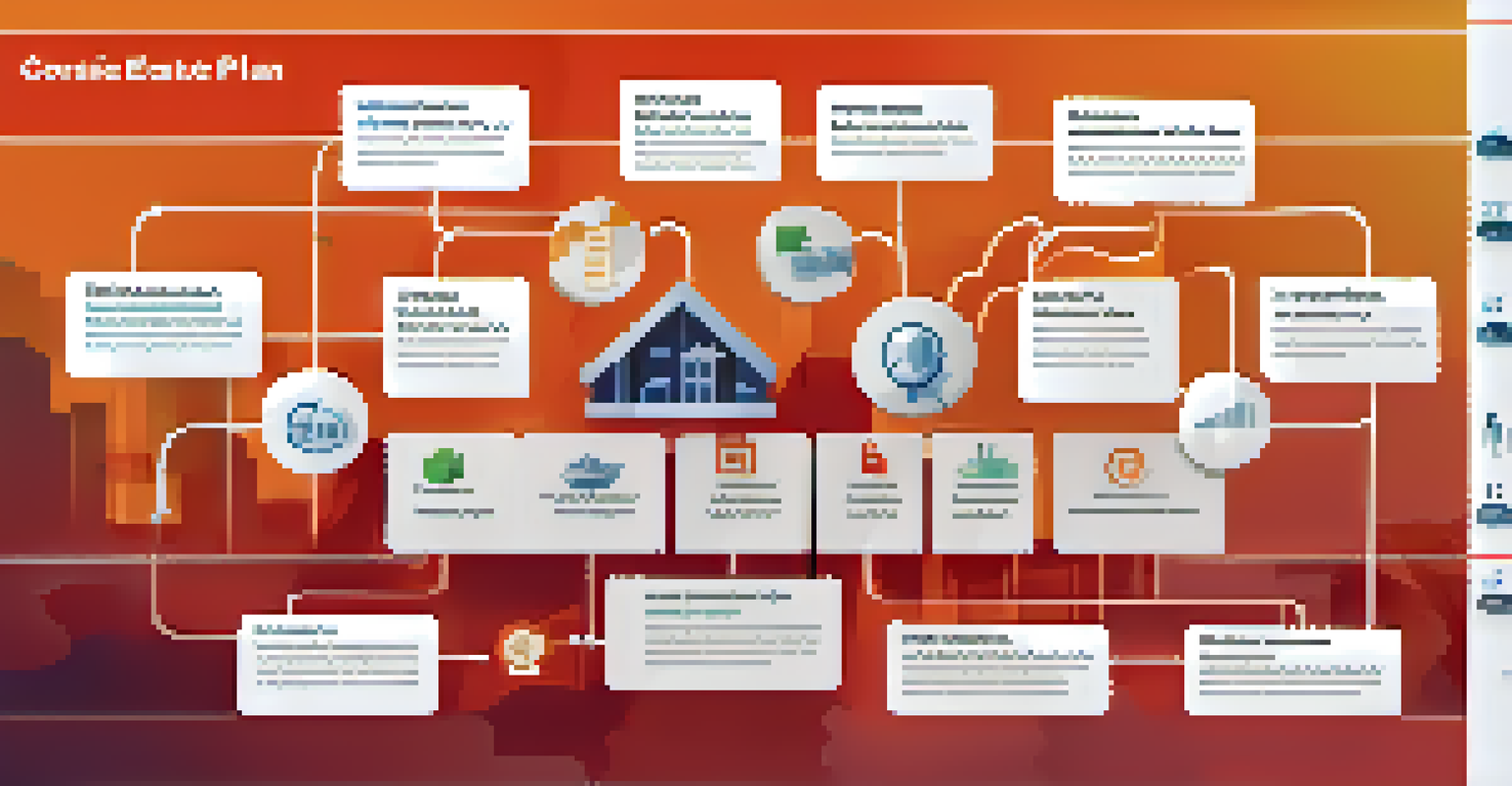The Importance of Crisis Management in Real Estate Marketing

Understanding Crisis Management in Real Estate Marketing
Crisis management refers to the process of handling unexpected events that could negatively impact a business. In the realm of real estate marketing, this can include things like market downturns, public relations issues, or even natural disasters. The goal is to minimize damage and maintain trust with clients and stakeholders.
In the midst of chaos, there is also opportunity.
When a crisis strikes, it can feel overwhelming, especially in the fast-paced real estate world. Without a solid plan in place, misinformation can spread quickly, potentially harming your brand's reputation. Understanding the fundamentals of crisis management enables real estate marketers to react promptly and effectively.
For example, consider a situation where a property suddenly faces legal issues. A well-prepared team can swiftly communicate the facts and reassure clients, turning a potential disaster into an opportunity to showcase transparency and reliability.
The Role of Communication in Crisis Management
Effective communication is the backbone of any crisis management strategy. In real estate marketing, clear and timely information can help mitigate panic and confusion. Whether it’s through social media, emails, or press releases, how you communicate can make all the difference.

During a crisis, it's essential to keep your audience informed. For instance, if a natural disaster affects a property listing, providing updates on safety measures and recovery plans can help maintain client trust. This approach not only keeps clients in the loop but also demonstrates your commitment to their well-being.
Crisis Management Is Essential
Having a solid crisis management plan helps real estate marketers effectively handle unexpected events and maintain client trust.
Moreover, maintaining open lines of communication fosters a sense of community. When clients feel they can reach out for answers, it strengthens the relationship and can turn a challenging situation into a testament of your brand's dedication.
Developing a Crisis Management Plan
Creating a crisis management plan is crucial for any real estate marketer. This plan acts as a roadmap for navigating potential crises, ensuring that everyone on your team knows their roles and responsibilities. A well-thought-out plan can save time and reduce stress when unexpected challenges arise.
Crisis can be a catalyst for change and growth.
Key components of a crisis management plan include identifying potential risks, establishing a response team, and outlining communication strategies. For instance, having a dedicated spokesperson can streamline communications and provide a consistent voice to your audience during a crisis.
Additionally, regularly reviewing and updating your plan is essential. The real estate landscape is ever-changing, and what worked last year might not apply today. Continuous evaluation ensures that your strategies remain relevant and effective.
Building a Resilient Brand Through Crisis Management
A strong crisis management strategy can help build a resilient brand. When clients see how effectively you handle challenges, their trust in your brand increases. This resilience can lead to stronger client relationships and even attract new clients who value reliability.
For example, a real estate company that successfully navigates a market downturn by providing transparent updates and support can emerge as a leader in their community. This not only reflects positively on the brand but also reinforces their commitment to their clients.
Communication Builds Trust
Clear and timely communication during a crisis reassures clients and strengthens relationships.
Moreover, showcasing your crisis management efforts in your marketing can differentiate you from competitors. Highlighting stories of how you supported clients during tough times can resonate with potential buyers who prioritize trust and stability.
Learning from Past Crises: A Key to Improvement
Every crisis presents an opportunity for learning and growth. After navigating a challenging situation, it’s vital to reflect on what went well and what could be improved. This introspection can enhance your crisis management strategies for the future.
For instance, if a specific communication method proved ineffective during a crisis, take note and consider alternatives for the next time. This commitment to improvement can help your team adapt and respond even more effectively in the future.
By analyzing past crises, you can also identify trends and prepare for similar challenges down the road. This proactive approach not only strengthens your crisis management plan but also reinforces your brand’s resilience.
Engaging Stakeholders During a Crisis
During a crisis, engaging stakeholders is crucial for maintaining trust and transparency. This includes not just clients but also investors, employees, and community members. Keeping them informed and involved can help mitigate concerns and foster a sense of unity.
For instance, hosting virtual town hall meetings can provide a platform for stakeholders to ask questions and voice their concerns. This open dialogue shows that you value their input and are willing to address their needs directly.
Learning Enhances Future Strategies
Reflecting on past crises allows real estate marketers to improve their strategies and better prepare for future challenges.
Furthermore, involving stakeholders in your crisis management efforts can lead to innovative solutions. Diverse perspectives can offer fresh ideas on how to navigate challenges, ultimately strengthening your approach and enhancing community ties.
The Long-Term Benefits of Effective Crisis Management
Investing time and resources in effective crisis management can yield long-term benefits for real estate marketers. A well-prepared team reduces the likelihood of severe damage during crises, allowing businesses to recover more swiftly. This agility can significantly impact overall business performance.
Moreover, companies that demonstrate reliability and transparency during crises are more likely to retain clients. Satisfied clients are not only more likely to return but also to recommend your services to others, amplifying your marketing efforts through word-of-mouth.

In the end, effective crisis management is not just about survival; it's about thriving in the face of adversity. By prioritizing crisis preparedness, real estate marketers can build lasting relationships and a robust reputation that stands the test of time.